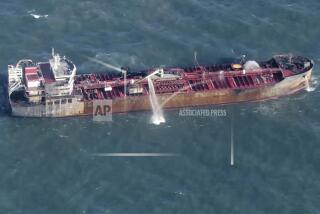Boat-Tanker Crash Spills Oil Into Boston Harbor
- Share via
BOSTON — A tugboat guiding a tanker from its dock struck and punctured the vessel, causing some 50,000 gallons of heating oil to pour into Boston Harbor, U.S. Coast Guard officials said Thursday.
The Alex C, owned and operated by Bay State Towing, was helping the Panamanian-registered tanker Posa Vina leave the dock at Tosco Marine Terminal in East Boston when the tug struck and ruptured the tanker’s port side 2 feet above the waterline at 8:30 a.m. EDT, the Coast Guard said.
“That particular fuel tank was holding 400 metric tons [about 112,000 gallons] of No. 6 fuel oil,” Coast Guard Lt. J.G. Rebecca Montleon said. “We estimate that 50,000 gallons spilled.”
By shifting the remaining cargo on Posa Vina, the crew was able to list the vessel to starboard so that the smelly, heavy oil stopped spilling, she said. A slick sheen remained on the surface.
“The booms are all deployed,” Montleon said. “There is some seepage under the booms, but they are all deployed.”
Neither vessel was in danger of sinking, the Coast Guard said, and there were no injuries reported.
The Coast Guard tested the crews for drugs and alcohol and interviewed witnesses as investigators tried to determine what caused the collision.
Montleon estimated it would be “three or four days before the initial cleanup is completed.”
Boston Harbor underwent a court-ordered, $6.1-billion cleanup after the 1988 presidential election in which its notoriously polluted waters were used to soil the candidacy of then-Massachusetts Gov. Michael S. Dukakis.
About 14,000 oil spills are recorded in the United States each year, according to the U.S. Environmental Protection Agency.
Capt. John L. Grenier, chief of the Coast Guard’s Office of Investigations and Analysis, noted that from 1973 to 1998 the volume of spills in U.S. waters was on a steady decline.
However, it was during that period, in August 1989, that the Exxon Valdez dumped 11 million gallons of oil in Prince William Sound in Alaska.
About 18 months earlier, in January 1988, a 4-million-gallon storage tank owned by Ashland Oil Co. split apart, polluting the Monongahela and Ohio rivers and temporarily contaminating the drinking water for 1 million people in Pennsylvania, West Virginia and Ohio.
More to Read
Sign up for Essential California
The most important California stories and recommendations in your inbox every morning.
You may occasionally receive promotional content from the Los Angeles Times.













